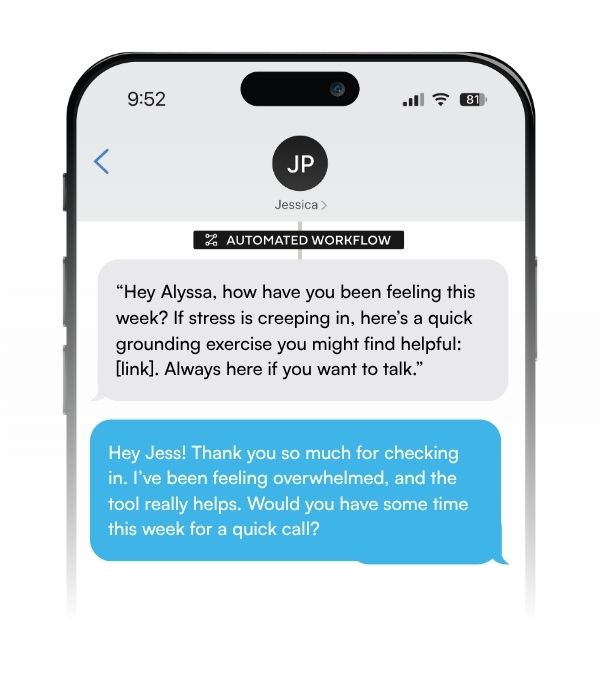Why Summer is a High-Risk Time for Alumni (and How to Stay Ahead of It)
Summer is a high-risk season for relapse. Learn how to spot warning signs early, support at-risk alumni, and scale your outreach with real-time tools and intentional strategy.
Summer is a high-risk season for relapse. Learn how to spot warning signs early, support at-risk alumni, and scale your outreach with real-time tools and intentional strategy.

Summer is often marketed as a season of ease—flip-flops, long weekends, and backyard barbecues. But for those in recovery, especially recent alumni transitioning out of treatment, summer can quietly shift from carefree to precarious. Without the built-in structure of school, work, or winter routines, it’s easy for this season to become a breeding ground for disconnection and relapse.
For alumni, the months between June and September often bring unique emotional and logistical challenges. Schedules loosen. Social invitations ramp up. Travel plans increase, sometimes bringing people face-to-face with old environments, strained family dynamics, or high-risk situations they haven’t navigated in sobriety before. On top of that, peer support systems can become less reliable as people scatter for summer plans, and regular therapy or support groups may pause or go virtual. The result? A subtle but powerful erosion of structure, connection, and accountability.
That’s why summer deserves a spotlight in your alumni engagement strategy—not as a time to wind down, but as a time to double down.
This guide explores why summer is such a high-risk period for alumni in recovery and offers concrete, compassionate strategies to help you get ahead of the curve. We’ll discuss what to look for, how to design seasonal support that works, and how Encyrcle’s platform can help you stay connected, proactive, and impactful, without burning yourself out.
Because relapse prevention doesn’t go on vacation. And with the right tools and touchpoints, neither does your support.
For many, summer is synonymous with freedom. But in recovery, too much freedom without support can quickly spiral into danger. What looks like sunshine and celebration on the surface often masks a complicated terrain of emotional triggers, loosened boundaries, and unexpected stressors. Here’s a deeper look at why summer can be especially risky for alumni, and what you should keep on your radar.
Structure is often the scaffolding that holds early recovery together. But in the summer, that scaffolding can disappear almost overnight. College students are on break. Therapists go on vacation. Work slows down. Daylight stretches longer than ever, and with it, unfilled hours.
That lack of structure creates a perfect storm for impulsivity and old habits to sneak back in. Alumni who were thriving in routine may suddenly find themselves with too much idle time, not enough direction, and a creeping sense of boredom or restlessness that used to be numbed with substances.
And while it might feel out of your control as an alumni coordinator, there are ways to help. With Encyrcle’s automated check-ins and mood tracking, you can identify patterns early and offer relevant support when structure starts slipping. Pair that with consistent summer programming—virtual or in-person—and you help alumni replace the void with connection and accountability.
Summer comes with built-in flashbacks. Think: outdoor concerts, beach trips, camping weekends, Fourth of July cookouts—all prime memory-lane events for those who used to drink or used to “enhance” the moment. Even well-intentioned family vacations or class reunions can stir up complicated feelings, especially when alumni find themselves back in the places (and sometimes with the people) where their substance use began.
What’s more, nostalgia can be sneaky. It often packages itself in a golden light—"Remember how fun that used to be?"—and skips over the darker parts. This selective memory can distort decision-making and fuel the temptation to “just have one.”
As an alumni coordinator, simply naming this dynamic in newsletters, event invites, or one-on-one messages can go a long way. When you acknowledge the emotional pull of summer, you give alumni permission to feel it—and prepare for it—rather than walk into it blind.
While summer looks like connection season on Instagram, the reality for many alumni—especially those in new cities or navigating life post-treatment—is loneliness. Roommates travel. Peers become busy. Support group attendance may drop. The very community that held them through the hardest parts of recovery can suddenly feel out of reach.
And unfortunately, isolation isn’t neutral—it’s a known risk factor for relapse.
That’s where intentional outreach matters. Use Encyrcle to create simple but meaningful touchpoints that remind alumni they’re not forgotten. A quick check-in text, a local alumni group meet-up, or even a digital “thinking of you” message can go further than you think. The goal isn’t to overwhelm them with activity—it’s to quietly reinforce: You’re still part of something.
The truth is, alcohol is everywhere in summer. Outdoor festivals. Sporting events. Weddings. Brunches. Rooftop parties. It’s normalized, expected, and often celebrated. Add in cannabis-friendly vacations, music festivals, and casual invitations like “Want to do mushrooms in the woods?”—and suddenly, even alumni who were solid in their recovery can feel caught off guard.
This is especially true for those in social circles that still use or drink, or for alumni who haven’t yet learned how to set boundaries in high-pressure situations. The more casual the context, the easier it becomes to rationalize a slip… and the harder it can be to admit if one happens.
That’s why proactive support matters. Host mocktail-making classes. Create a summer sobriety resource kit. Start a virtual “Sober Summer Challenge” and offer digital badges, milestones, or spotlight features for participation. The key is to replace access to substances with access to purpose, community, and self-efficacy.
Relapse rarely happens out of nowhere. More often, it begins subtly, with missed calls, vague texts, and slow disengagement. By the time a full-blown crisis occurs, the signs were already there… they just went unnoticed.
The good news is, you don’t have to wait for a call from a worried parent or a sudden readmission request to take action. With the right tools and intentional outreach, you can spot the quiet warning signs before they snowball into something unmanageable. Summer doesn’t have to catch you off guard.
Not every red flag is obvious. Some are small: missed responses, shorter replies, changes in tone. Alone they seem minor; together they often signal deeper struggles.
This is where Encyrcle helps. By tracking engagement trends—response rates, sentiment shifts—the platform surfaces alumni who might be struggling, even when they haven’t said it outright. It’s almost like having an early-warning system for support.
Better yet, you can set up automated nudges. A simple “Hey, just checking in—how’s summer feeling for you?” can create space for honesty at the right moment.

While every alum’s journey is different, some dates tend to carry more emotional weight or logistical challenges across the board. These seasonal “risk windows” are predictable, and that means you can prepare for them.
Use these time markers as prompts—not just to plan programming, but to reach out intentionally. Consider sending Encyrcle-powered messages a few days before these dates, offering encouragement, tools, or invitations to a low-pressure event. The key is staying just ahead of the curve.
While anyone can hit a rough patch in summer, certain groups of alumni tend to be at higher risk, especially when multiple vulnerabilities intersect.
Keep an extra-close eye on:
Encyrcle makes it easy to segment your alumni list by these criteria and prioritize outreach accordingly. It’s not about labeling people as fragile—it’s about recognizing who might need a little extra scaffolding when the season shifts.
By getting intentional now, you’re not just managing risk. You’re reinforcing safety nets, rebuilding trust, and helping alumni write a different story this summer—one rooted in connection, not crisis.
When it comes to alumni care, summer strategy isn’t about doing more—it’s about doing the right things more intentionally. Small, well-timed actions can have a major ripple effect, especially in a season when disconnection happens quietly and quickly.
Staying ahead of relapse risk doesn’t require reinventing your entire system. In fact, most of the time, it’s about scaling what already works, just with a slightly sunnier lens and a bit of smart automation. Here’s how to get proactive without burning yourself (or your team) out.
One of the simplest—but most effective—tools in your arsenal is consistent outreach. When alumni hear from you regularly, it reinforces that they matter even when they’re not in crisis. That alone can shift how they relate to recovery.
Set a goal of weekly check-ins from June through August. These don’t need to be lengthy or deeply clinical. In fact, they’re more effective when they sound human:
Using Encyrcle, you can pre-schedule these touchpoints as a campaign and personalize based on engagement level or vulnerability. The tone should feel like a trusted guide reaching out—not a parole officer. When it’s framed with care, even automated messages can feel deeply personal.
Data is your friend. Use what you already know—recent discharge dates, engagement trends, past participation—to build a “Summer Support List” of alumni who may be at higher risk. These aren’t people to hover over. They’re people to anchor.
Once you’ve identified them, assign a light-touch follow-up plan:
Encyrcle lets you tag and organize alumni into custom lists so you’re not chasing down sticky notes or digging through spreadsheets. You’ll be able to track who’s received what, when, and who might still be slipping through the cracks.
Alumni don’t just need you—they need each other. Summer’s a great time to create low-lift “sponsor squads” or mini-accountability pods that help alumni stay connected peer-to-peer.
These don’t need to be formal recovery sponsors. Instead, try pairing alumni with one or two others and giving them a shared goal:
You can even kick it off with a message like:
“We’re starting a Summer Accountability Squad! Want to be matched with a buddy to help each other stay grounded, connected, and supported these next few months?”
Encyrcle can help facilitate opt-ins and group matching, making it easy to get this off the ground without a heavy administrative lift.

Summer events don’t have to be weekly bonanzas. What alumni need isn’t constant entertainment, but gentle reminders that recovery can still feel good. Lean into programming that offers joy, purpose, and low-pressure interaction.
That might mean:
Or any of the weird, wonderful ideas from our recent article, Beyond the BBQ: Meaningful Alumni Events for Summer
Even one or two well-planned gatherings over the summer can make a lasting impact.
Bonus: Encyrcle lets you send invites, track RSVPs, and follow up automatically with those who attend (and those who don’t).
Let’s be honest: most alumni teams aren’t bursting with extra capacity during the summer months. Staff take vacations. Budgets tighten. Programming slows. But the need for support doesn’t pause, and trying to manage it all manually isn’t just exhausting, it’s unsustainable.
That’s where technology steps in, not to replace the human connection that makes alumni care powerful, but to reinforce it. With the right platform, your team can extend its reach, stay consistent, and offer timely care… without constantly playing catch-up.
We all wish we could spot the moment someone starts to disengage. But when your inbox is overflowing and your event calendar is packed, subtle signs often get missed—until it’s too late.
Encyrcle changes that. By monitoring alumni engagement patterns in real time, the platform can flag when someone is slipping, whether it’s shorter responses, increased negativity in language, or skipped check-ins. You don’t have to rely on gut feelings, anecdotal memory, or someone finally calling in distress.
Instead, Encyrcle quietly scans the data in the background and brings the right people into focus. You’ll know exactly who might need a gentle nudge or an extra layer of support—before they fall through the cracks.
Not all alumni need the same level of attention at the same time, and trying to offer individualized care without a system to support it? That’s a recipe for burnout.
Encyrcle allows you to segment alumni based on behavior, vulnerability, and past engagement.
From there, you can automate workflows that reflect exactly what they need:
The magic is in the consistency. Even if your team is down a member or your calendar is light, alumni still feel held, because the care doesn’t depend on memory or bandwidth. It’s baked into the system. Scalable doesn’t have to mean impersonal. With Encyrcle, it means sustainable, so your team can focus on what matters most: making recovery feel like a lifelong relationship, not a closed chapter.

Yes, summer brings risk—but it also brings opportunity.
When approached intentionally, these sun-soaked months can become a powerful time to deepen trust, reinforce recovery, and remind alumni that connection doesn’t disappear when the calendar changes. In fact, it’s often needed more than ever.
The key is staying ahead of the curve—anticipating what might unravel before it does, and using your outreach as a lifeline, not a lifeboat. When you combine meaningful programming with scalable support systems, summer stops being a reactive season. It becomes a proactive one.
And that’s where Encyrcle fits in. With tools to automate check-ins, monitor alumni behavior, flag potential risks, and personalize your care—even when your team is short-staffed—you don’t have to choose between doing it all and doing nothing at all. You can scale compassion without sacrificing quality.
Want to identify at-risk alumni before the red flags turn into relapses? Encyrcle helps you automate, track, and scale your outreach all summer long.
Book a demo and stay ahead of the curve.